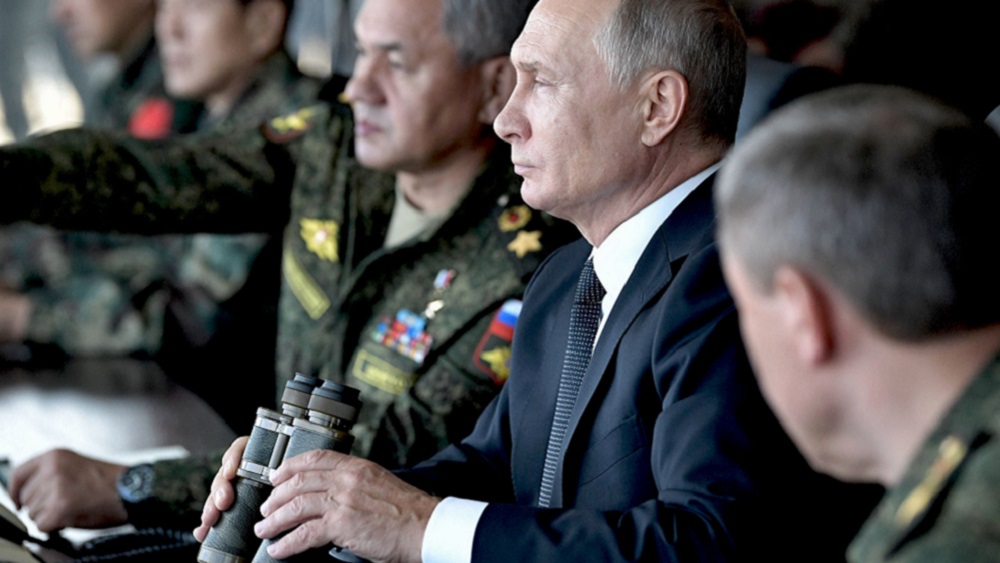
In his book “What is Russia up to in the Middle East?”, Dmitri Trenin director of the Carnegie Moscow Center argued “Russia’s re-entry into the Middle East, culminating in the military intervention in Syria, was essentially part of Moscow’s endeavour to return to the global geopolitical chessboard as a great power. Other motives, such as reversing the dynamics of the Arab Spring and the surge in Islamist radicalism, as well as physically eliminating extremists hailing from Russia itself, were secondary.”(1) The Kremlin’s strategy has combined direct engagement in Syria, pragmatic pursuit of a situational alliance with Turkey and Iran. However, it has to contend with a number of limitations, since “the economic and financial base of its foreign policy overall, and in the Middle East specifically, is still inadequate for a country that projects itself as a great power.”(2) However, other analysts have pointed out “Russia Is Losing in the Middle East and Putin’s apparent victories in spreading Russian influence are mirages, some of which have come at a great cost.”(3)
In this paper, Russia politics observer Zaki Shaikh examines Russia’s divergent drivers of foreign policy agenda in the Middle East and the factors, which contributed to Moscow’s selection of Middle East as a springboard to stage a comeback in the wider global arena. Russia hopes that its present environment in Syria and possible engagement in Libya will as an advertisement, as a means to promote the value of Russian defence products and armament for a vast potential market of buyers. The paper invites attention to Russia’s use of the military might, active diplomacy, and trade as well as energy as vectors of cooperation for expanding relations in both the Middle East and North Africa. The paper also examines how Russia is expanding leverage and active pursuit of pragmatic priorities: These include Moscow’s resolve to frustrate NATO allies and pursuits of forcible change. Russia attempts to capitalise on weak decision and poor execution of Western Nations Policies in the Middle East.
The paper probes into the range of objectives Russia pursues in the Middle East, its recent overtures, and President Putin’s priority pursuits in the region drawing particular attention to twists and turns in the turbulent Turkish-Russian Relations. The paper concludes with mentioning Moscow’s information warfare measures and a possible backlash it fears from the United States both in the Middle East and beyond.
Just like Moscow’s recent pursuits in Syria, this involves expanding and entrenching the Russian presence, positioning itself as a great power, gaining regional influence on a par with other powers and frustrating agendas of its competitors and rivals. By extending its support to Libyan general Haftar, Russia is stepping into a vacuum left by the American retreat, gaining influence and creating a short-term fix while ensuring long-term conflict and insecurity. This in Russian expectations will enable it acquire a foothold, entrench its presence at Libya’s Mediterranean ports and also earn a say in the efforts to contain and resolve the major crisis which has erupted in North Africa.
This section also points out what Russian continued presence in Syria aims to project.
The Russian continued presence in Syria aim at projecting the capabilities of the Russian military where successful diplomatic manipulation is achieved by demonstrating the efficiency of hard power as part of manoeuvres to acquire a better bargaining position.
The Russian intervention in the Syrian civil war represents Russia’s return to reclaim and reaffirm its role in the Middle East. Russia also seeks to gain influence and attract investments. Tactical agility, political acumen, resourceful diplomacy to position its own interest with partners, and synergizing situational allies in a complex region have all helped Russia project its power to the next level in the Middle East in particular and the world stage in general.
What the Recent Overtures have yielded for Russia?
The Russian active outreach in the Middle East reflects Moscow’s desire to overcome the assumption that its influence had been limited due to any lack of capacity to protect its allies. Russian engagement in Syria aims to demonstrate its determination to deter and deflect attempts to dismantle Bashar al-Assad from power. In being able to accomplish that aim Russia has carved out a bigger role by establishing itself as a major actor. By expanding its clout, Russia desires to play a leading mediator’s role in the ongoing and unfolding conflicts in Syria, Libya and elsewhere in the regions.
President Putin intends to send a signal to the rulers in the Middle East and North Africa that he is willing to confront and counter the efforts made by Western powers attempting to disrupt the status quo to change or topple present regimes.
The following passage points out to what Russian continued presence in Syria aims to project? It also points out how Russia focuses on its core interests in the Middle East. The paper analyses what the recent overtures in the Arab World have yielded for Russia and whether there are costs and consequences which Moscow anticipates as a result of its activities in those regions.
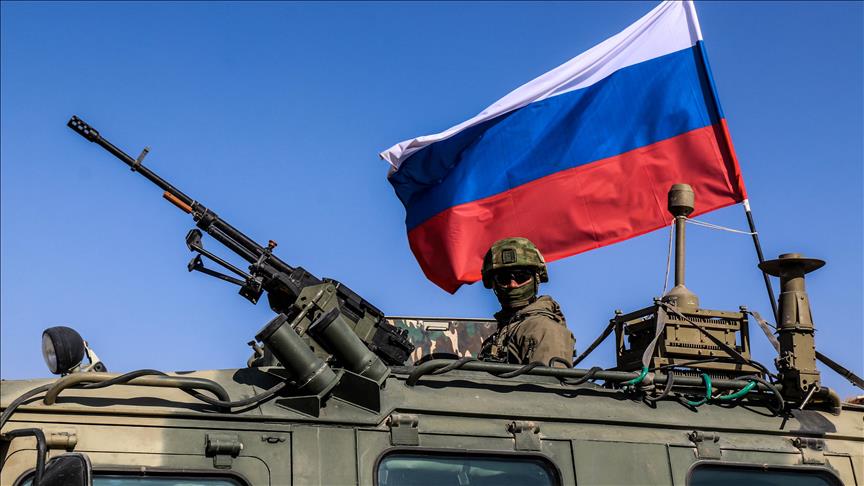
The unsettled Middle East serves as a showcase to display how Russia is suited uniquely to conduct its peculiar style of politics in pursuit of its priority objectives in the region. As evident from Russian past pursuits in Eastern Europe and the Western Balkans, “Russian creates and exploits divisions in order to further its own influence at the expense of EU and the US”.(4) For Putin, the divergences and dichotomies in the Middle East States serve well his pursuits of projecting power in that region and beyond. The Russians show that they are savvy in making use of arising opportunities by exploiting the conditions created by inaction, inability, weak decisions, poor choices and mistakes committed by competing powers. Working in an atmosphere where no two countries enjoy enough harmony to calibrate a common position vis-à-vis the Russians, Moscow finds such conditions to their advantage in extracting maximum leverage out of limited diplomatic and financial leverage.
It is necessary to remain mindful of what Russia’s priorities are and what objectives it strives to pursue and promote in the Middle East. Above all, Moscow aspires to be on an equal footing with the United States and other Western powers when it comes to handling the crisis in that region. Russia has also set a few red lines: it will frustrate, and if necessary even fight, all attempts which confront Moscow’s vision and pursuit of its interests in the Middle East. For that reason, it will enter into a partnership with any state(s) confronting the US agenda. Winning support and funding from the Gulf States will help Russia partly deflect Western economic sanctions.
Moscow’s foreign priorities for the short run, even when arbitrary, tend to be opportunistic and transactional and such an approach in turn serves its long-term intent which is to “maximise short-term economic, military and political advantages in the Middle East while reducing the short-term advantages and opportunities of its adversaries”(5) While Russia’s regional strategy may not be clear as to what ends it is driven, it does pursue a functional strategy by seeking to improve its short-term economic, military, and political advantages on the one hand while deferring and even denying short-term advantages to prospective adversaries on the other.(6) For its domestic constituency Russian leaders aspire to appear as a vigilant, strong and viable power able to defend itself against Western attempts to weaken the state.(7)
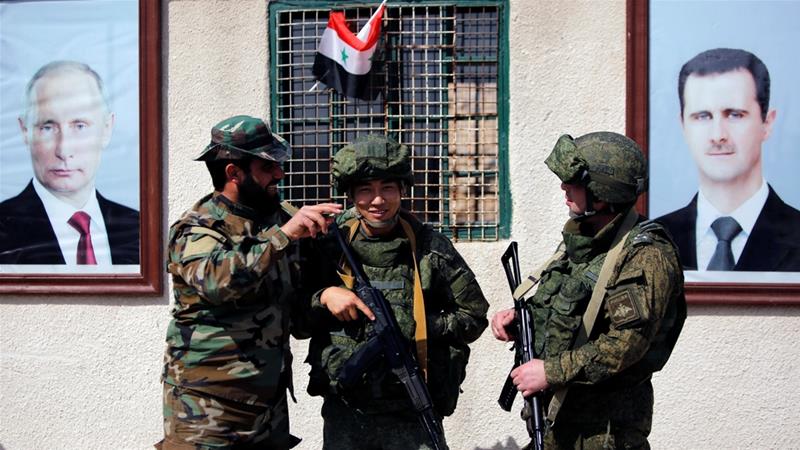
Putin pursues actions for undermining and dividing the West by empowering forces in Tehran and Damascus. Perceiving indecision and inaction from the West, “Putin has complicated the operating environment in the Middle East and the Mediterranean and augmented Russia’s influence”. This is clear from the United States and their allies’ failure to demonstrate that Putin’s backing of Assad could cost Russia.(8) As observed from Russia’s recent pursuits in Syria, in Libya too, the Russian engagement aims to exploit existing “relationships and influence state behaviour, make money on the margins and complicate Western policy options in the region”.(9)
By intervening militarily to save Bashar Assad in Syria, Russia displayed political resolve and military strength that contributed to improve its standing in the Middle East. As a result, Moscow’s image in the region has been bolstered as it now sees itself recognised as key actor and at times with a capacity to mediate in conflicts from Libya at one extreme to Yemen at the other. Russia’s dominating role in Astana peace negotiations has allowed Assad’s army to much territory and has emboldened Moscow to seek a mediator’s role for itself in the conflicts of the Middle East.
Russia has been using the civil war in Syria to test its weapons, train its military personnel and also to advertise its defence equipment for boosting its arms sales to the region. Having a firm foothold at Syria’s Latakia airbase and Tartus naval base has provided Russian President Putin with “an opportunity to entrench Russia’s military presence in the region more permanently, and gain an entry point into the region”.(10)
To further its geopolitical and economic interests Russia also makes use of energy cooperation with other countries. It expects to reap dividends from its backing of the Assad regime as Moscow won exclusive rights to build up the Syrian oil and gas sectors bringing huge profits to Russian energy companies. By keeping Tartus as a naval base, Russian ships can stay in the Mediterranean without needing to return to the Black Sea ports for servicing. Moscow’s ability to have a big say in Syria’s future is considered as its major geopolitical gain in status. This helps boost Russian influence considerably in the MENA region.(11)
The Commander of Russia’s Southern Military District, Aleksander Dvornikov, has argued in the Russian publication Military-Industrial Courier, that without information warfare, Russia would not have achieved success in its operations in Syria. This he explained is due to achieving geopolitical goals through the application of complex non-military measures, which are even more effective than military ones. The main goal of these measures is not the physical destruction of the enemy but forcing the complete submission of their will.”(12)
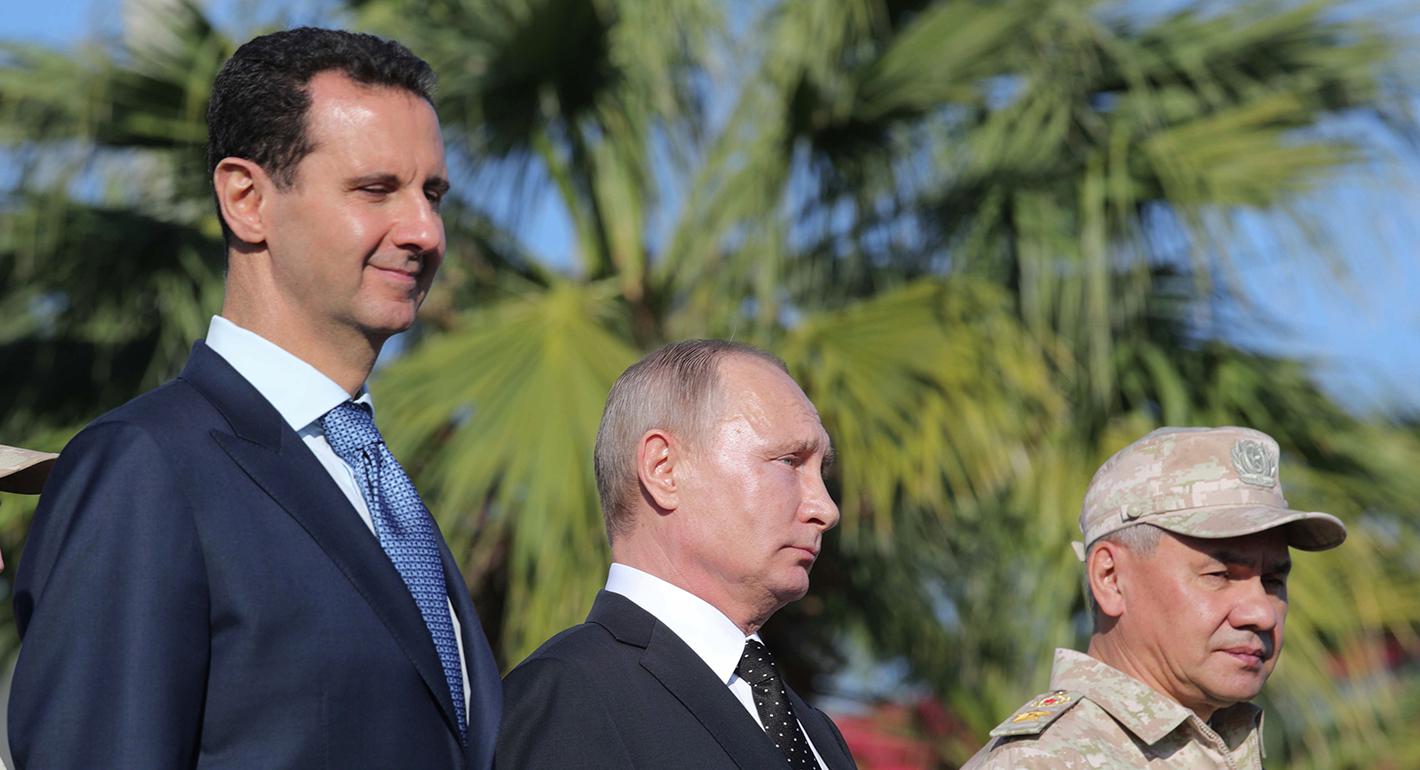
This approach deems information warfare as central to a state’s arsenal to use in confrontation against other states, where countries’ elites and public perceptions are significant when pursuing the aim to influence both the adversary’s strategic calculus as well as the general public’s attitude.(13) Russia’s former ambassador to NATO, and now a deputy Prime Minister Dmitry Rogozin, describes information warfare as an “intensive struggle in the information environment aimed at gaining informational, psychological and ideological superiority, inflicting damage to information infrastructure, undermining political and social systems, as well as psychologically shaping military personnel and populations.”(14)
Moscow treats Iran as a deservingly equal partner in its efforts to address the challenges in the Middle East. Both Russia and Iran share a common interest to see US influence reduced in the Middle East - an aim for which they are prepared to keep their differences aside. Both Russia and Iran share an animosity for the US. For many years the economies of both these states have been experiencing sanctions imposed by the US. Iran seeks Russian support to counteract the crippling effects posed by US sanctions. Moscow seeks to increase its influence through trade, transfer of technology and securing access to air, sea and land routes. The two countries are developing the North South Transport Corridor which will allow Russian exporters to gain railway access to the Persian Gulf via Iran thereby reducing time for the Russian exports reach Indian and Gulf markets.
Twists and Turns in Turkish-Russian Relations
The evolution of Turkish-Russian relations offers many points for contemplation. Their relationship is driven by prudent realism, shaped by a commonality of interest and necessitated by each side depending on the other’s support. When it comes to Turkey, there are a few overlapping factors which help it sustain its partnership with Russia. Both sides feel that they have been pushed into a corner and much discriminated against. Secondly, both nations have their own set of grievances vis-à-vis how NATO treats them. Their relations are also shaped by both sides’ desire to tell their rivals that they can still avail themselves of better options even if side-lined by European Union and cornered by NATO.
Russia has proved very creative in exploiting differences in pursuit of advancing its own interests to the detriment of the US and the EU. Finding an opening amid Ankara’s deteriorating relations with its traditional allies in the West. Russia aspires to reduce and even negate Turkey’s affiliation with NATO. Having acquired access at Iran’s Hamadan and Syria’s Humaym airbase, now Moscow also intends to gain access to bases and ports in Yemen and Sudan also. Russia considers Turkey a vital test of how effectively it can draw Ankara closer to Moscow and away from NATO and to take advantage of Turkey’s grievances towards the European Union. With Turkey-United States relations strained, the Russians seek to benefit from the appearing wedges which, in their view, undermine Washington’s interest in the region.
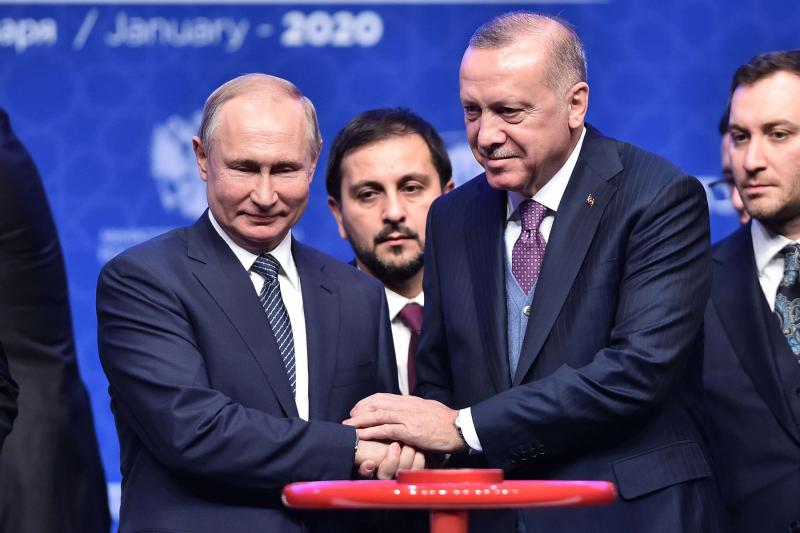
Both Turkey and Russia aspire to be recognised as guarantors of peace in the Middle East, Syria and in Africa (Libya) in order to assume a better bargaining position vis-à-vis regional players and global powers. Above all, it is the sphere of energy which oils the lever of their interaction. Telling evidence of that is inauguration on 9th of January 2020 of the Turkstream gas pipeline running from Russia to Turkey. As Russian plans to build the Southern Stream for gas supplies Europe were blocked, Turkey became the most important customer for Gazprom the Russian Gas Industries Corporation. Turkey aspires to acts as an energy hub to Europe and views Russia as one of its key partners. Turkstream suits Russia’s geopolitical and economic interests well as it also enables supplies of Russian gas to reach Europe bypassing Ukraine. Such advantage allows Russia’s major gas producer, Gazprom to maintain a dominating position in the gas markets of Europe.
Putin’s Priority Pursuits
Russia proactively endeavours to exploit each and every sectarian or ethnic cleavage in the Middle East which can enable it to pursue the consolidation of its interests. For that objective, Moscow deploys a range of tools including diplomacy, instruments of power, arms sales, energy deals, show of muscle and information warfare. All these measures serve Moscow’s wider strategy to “exploit or create regional crisis wherever possible, to force itself back into the picture” as a great global power which must be part of the resolution of those issues.
How does Russia focus on its core interests in the Middle East? In the region Russia strives to discredit and delegitimise the US presence and dislodge them from the region; to fill the vacuum itself; to disrupt the efforts of US allies; to seek expansion of its influence and secure a presence in the region and to use all such components to attain a better bargaining position. Furthermore, Moscow strives to “exploit crises to create a regional bipolarity against the West”. With such an approach, Moscow aims to force the US and its allies to “take Russia at Moscow’s own self-evaluation and cement a system of global multi-polarity to Russia whose voice must be heard as a global power along with the United States and China.(15)
In his short monograph, Dmitri Trenin offers succinct insights on the prominent features of Russian foreign policy in the Middle East pursued through overt and covert confrontation, expanded diplomatic consultation and increased commercial exchanges. Trenin refers to paramount pragmatism as being Russia’s strength as it has proved deft at playing the bigger game deflecting and diluting differences while manipulating fractured and fragmented entities which remain friendly towards Moscow.
Moscow seeks to balance its interests in a way which enables it to optimise its gains without compromising its credibility with either side. Moscow displays pragmatism and considerable cynicism in cautiously dealing with complex societies with countervailing trends. Russia is well-suited to an environment where different situations around the shifting nature of alliances and allegiances result in very different combinations of protagonists.(16)
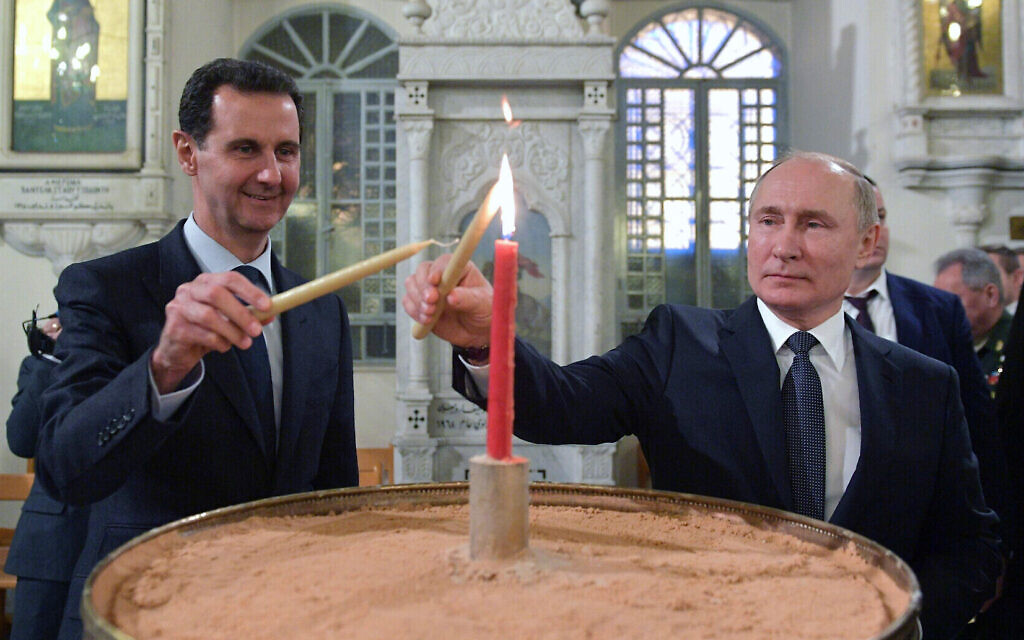
Commercial Motivations
The potential of Russia’s foreign relation outreach is constrained by the current structure of the Russian economy which remains insufficiently diversified, notes Trenin who fears that “this primitive structure of trade and economic relations will persist and limit economic changes”.(17) Trenin is quite candid about Russia’s intention concerning its key economic priorities. He helps to understand how Russia is adjusting its position vis a vis the Middle East, how these two sides are drawing closer to each other and what specific outcomes are being pursued by the stakeholders in their endeavours. The years immediately after its independence 1991-2000 did not turn out to be smooth for Russia as it found Brussels a tough negotiator with huge demands and high expectations.
This made Russia seek markets and opportunities in places where it could have far more wiggle room to gain better advantage. In recent years the economic dimension of foreign relations has increased in significance for Russia. The Russian Federation is primarily interested in making money abroad. In that context it sees the Middle East’s diplomatic arena as “a bazaar where it has some valuable goods to sell, which it intends to do for the highest price”.(18) Russia approaches the Middle East “as a major market for its defence industry”.(19) Russia’s recent forays into the region is helpful to win more contracts as Russia’s military operations in Syria are expected to boost the performance and efficiency of Russian-made weapons and “further advertise the value of Moscow’s politico-military backing”.(20) It is a crucially important geo-political position in the region which keeps
Moscow intensely interested in the Middle East as the strategic landscape keeps changing. Among all Arab states, Algeria is the largest purchaser of arms and “the country will continue to depend on Russia for maintenance, modernization, and new arms”. For Russia, the revenue from its defence industries will come from foreign arms sales, this is where “the military comes as a major market”.(21)
Russia-US Ideological Confrontation in the Middle East
An overarching goal of Russian foreign policy is to replace a unipolar international order dominated by the United States with a multipolar world. It is in this context that the Russian actions should be seen in the Middle East and in other regions of the world. Russia engages in mediating conflicts, investing in energy projects and selling arms in pursuit of increased influence. Russia sees more room for itself in a Middle East which is disappointed by Western interventions and angered over the reversal of US engagement. Moscow finds it expedient to capitalize on all signs of US weakness and project them as its strength and will endeavour to cause a US retreat from the region.
A leading veteran of Russian diplomacy, Igor Ivanov, has alleged that irresponsible acts carried out by the US in the Middle East and North Africa have led to making the situation in those regions not just uncertain but more prone to vulnerability. Ivanov went as far to allege that certain acts by US “undermined the legal foundations of the entire system of international relations”.(22) For its part, the US remains defiant in its attempts to impose its own terms over the rest of the world. Owing to its assertive policies, the US is increasingly becoming unpopular and isolated, Ivanov claimed, and predicted that stronger anti-US sentiments will lead to a weakening of American influence on the developments in the region.
In Moscow, it is also claimed that in the interest of global security, actors such as Russia are both capable and willing to take on the responsibility of opposing the unrelenting pressure applied by the US. They point towards the experience of multilateral cooperation under the Shanghai Cooperation Organization and BRICS that allows participants to engage in a constructive atmosphere which Russian coordination with China will help make even more productive.
Whereas Russia sees the Middle East as an asset, some of the US President Trump’s officials sees it as a liability and aims to disentangle itself from that region. Hence the priority given to a US presence and activities is receding that has led them to consider ways for winding down the engagement which is now considered to be a drain on the United States’ resources. The record over recent decades has displayed little effectiveness by the US engagement in the Middle East. To frustrate the United States’ plans in the Middle East, Moscow exploits opportunities which magnify US indecision and inaction which has turned into “the attrition that years of non-stop combat had on the United States Armed Forces.(23)
During the Obama presidency, the Russians exercised their muscles in Ukraine and in Syria and in the 2016 US presidential elections. One could feel that they were trying to attract attention by disrupting the game, notes ex-US envoy to UN, Samantha Power, adding: Such attempts allowed Putin to remain in power and, most importantly, to re-engage in global negotiations despite Russia's inherent vulnerabilities owing to an aging population and a weak economy. It would not have worked if democracies remained united. Still if the USA maintained applying pressure, [for the Russian president] the weakness of the internal situation would have been much more noticeable.(24)
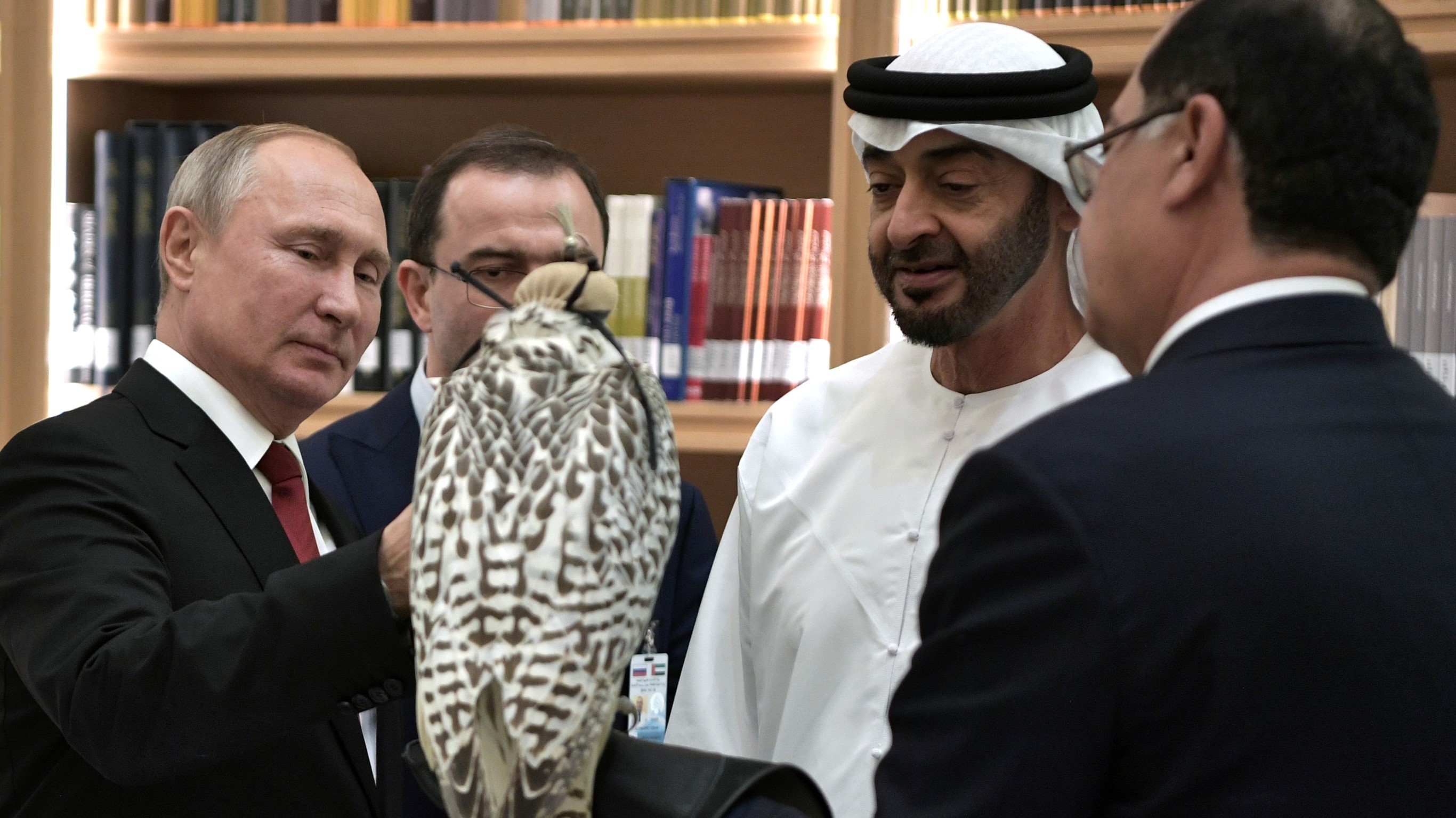
Fearing a Backlash?
Apprehensive of a possible and imminent backlash from Washington to deter and discourage what Washington alleges as Russian cyber intrusions into its political, economic and security domains, a briefing have been held at the Russian Senate to alert its members about the “West’s plans to wage a war against Russia”.(25) Oleg Morozov, a member of the Russian Senate’s Committee for Foreign Affairs has claimed that Washington is preparing for a cyber war. “For us, the matters are quite clear. In fact, this is a preparation for cyber warfare, for cyber-attacks to cause damage in cyber destruction. All those efforts will not go unanswered. Russia has repeatedly proposed to the United States come to an agreement, to find common approaches so as not to unsettle each other with these attacks, which may push both sides to a war. If there is appropriate preparation on the part of America, then it will be on our side”, Morozov concluded.(26)
The West has been waging an information war against Russia for past 15 years, trying to ruin the country from the inside, believes Franz Klintsevich, a member of the Russian Senate’s Defence and Security Committee, adding that Moscow has successfully countered attempts to denigrate the Russian Federation. He also claimed that the US cyber command has prepared to target information warfare measures against senior officials and businessmen of the Russian Federation. These measures are said to have been put in place in case Moscow tries to intervene in the course of elections in the US in 2020.
In Morozov’s opinion, there was no evidence to categorically establish that the Russian Federation somehow influenced the results of the US presidential election in 2016. However, in the USA they continue to pedal this topic in order to justify their further actions in the information field.
Negative claims are aimed to “create a negative image of Russia in the world, Klintsevich alleges adding that it has become a fashion to blame Russia. Through their information war, the West is trying to damage us from within and undermine the foundations of nation-building. Fortunately, in all these fields, we have counter measures in place in one form or another. He then quotes the chief of the Russian General Staff, Gareev Makhmut, who has said: “Instead of engaging in a conventional attack, the US will conduct a different mode of war with us”.(27)
The West has demonized Russia for many years, claims Klintsevich and cites as an example the incident with the Malaysian Boeing 777-200ER, which was flying from Amsterdam to Kuala Lumpur, and was shot down over Donbass in Ukraine. Russia was accused of being behind the incident. Klintsevich also recalled that, to date, there is still no clear understanding of what happened to the plane, because it is a “rigged crisis”. Klintsevich claims that an information war is being waged with the aim of discrediting Russia totally. The list include the claims made by the White Helmets in Syria about use of chemical weapons made by the Assad regime.
In conclusion, despite being a relatively less resourceful player, Russia has been successful in playing some strong hands in the Middle East. Moscow has managed to make savvy use of opportunities by exploring conditions and optimising the openings that were created owing to weak decisions, poor choices and even mistakes compounded with action and in abilities to act timely and strongly. Russia has been successful in extracting maximum leverage even out of a minimum range of options under challenging circumstances. In the Middle East, Russia comes with a limited set of tools and even lesser resources to back its pursuits. Yet they still remain able to engage with the region’s states using it as a counter balancing approach. The fact that the Russian leadership is able to engage with conflicting sides in the region serves Russia well. A key feature of Russian outreach in the region is its pragmatic balancing act amid opportunities for setting of one belligerent party against the other to maximise advantage.Tactical agility, political acumen, resourceful diplomacy to position its own interest with partners and synergizing situational allies in a complex region have all helped Russia project its power onto the next level in particularly in the Middle East and on the world stage in general.
(1) Nicu Popescu et al. Russia’s return to the Middle East Building sandcastles? European Union, Institute for Security Studies, CHAILLOT PAPER Nº 146, July 2018
(3) Rajan Menon, “Don’t Believe the Hype. Russia Is Losing in the Middle East—and Around the World”, Foreign Policy, November 18, 2019 https://foreignpolicy.com/2019/11/18/vladimir-putin-russia-losing-power…
(4) Martin Russell, Russia in the Middle East: From side lines to centre stage, European Parliamentary Research Service (Brussels, 2018) available at www.europarl.europa.eu/RegData/etudes/BRIE/2018/630293/EPRS_BRI(2018)63…
(5) Ben Connable and Becca Wasser, The Limits of Russian Strategy in the Middle East, LSE Blog, https://blogs.lse.ac.uk/mec/2018/05/09/the-limits-of-russian-strategy-i…
(6) J. Sladden et al., Russian Strategy in the Middle East https://www.rand.org/pubs/perspectives/PE236.html accessed on 28 January 2020
(7) Stephen Blank, Beyond Syria: Moscow’s Objectives in the Middle East, April 2018, https://www.atlanticcouncil.org/blogs/new-atlanticist/beyond-syria-mosc…
(8) Anna Borshchevskaya, ‘Russia's Strategic Objectives in the Middle East and North Africa’, Testimony submitted to the House Foreign Affairs Subcommittee on the Middle East and North Africa, 15 June 2017 https://www.washingtoninstitute.org/uploads/Documents/testimony/Borshch…
(9) Ben Connable and Becca Wasser, The Limits of Russian Strategy in the Middle East https://blogs.lse.ac.uk/mec/2018/05/09/the-limits-of-russian-strategy-i…
(10) Borshchevskaya, Russia's Strategic Objectives, op cit.
(11) Martin Russell, Russia in the Middle East From side lines to centre stage, European Parliamentary Research Service (Brussels, 2018) available at www.europarl.europa.eu/RegData/etudes/BRIE/2018/630293/EPRS_BRI(2018)63…
(12) Aleksandr Dvornikov, “Cadres for a New War”, Military-Industrial Courier, [in Russian], 23 July 2018.
(13) Blagovest Tashev, ‘Russia’s Information Warfare: Exploring the Cognitive Dimension’, MCU Journal, vol. 10, no. 2, Fall 2019; also see: Dmitry Adamsky, “From Moscow with Coercion: Russian Deterrence Theory and Strategic Culture,” Journal of Strategic Studies 41, nos. 1–2 (2018): 33–60,
(14) Dmitrii Rogozin et al., “Information Warfare,” in War and Peace: Terminology and Definitions, [in Russian], (Bucharest, 2011).
(15) Stephen Blank, Beyond Syria: Moscow’s Objectives in the Middle East, April 2018, https://www.atlanticcouncil.org/blogs/new-atlanticist/beyond-syria-mosc…
(16) Dmitri Trenin, What Russia is Up to in the Middle East? (London, 2018), p. 110-112
(22) Igor Ivanov, Searching for a New World January 24, 2020 https://russiancouncil.ru/en/analytics-and-comments/analytics/searching…
(23) Aaron Stein, Narrowing Interests in the Middle East: Planning for Great Power Competition https://www.fpri.org/article/2020/01/narrowing-interests-in-the-middle-… p.3
(24) Samantha Power interviewed by Laure Mandeville: «La Chine est notre défi majeur et ce n’est que le début!», Le Figaro, 13 février 2020 https://www.lefigaro.fr/vox/monde/samantha-power-la-chine-est-notre-def…
(25) Russian Senate briefed how the West is planning to wage war against Russia [ in Russian] https://politros.com/156912-v-sovfede-rasskazali-chem-dlya-zapada-obern…
(26) https://nation-news.ru/492669-zapad-15-let-vedet-protiv-rossii-informac…
(27) Russian Senate briefed how the West is planning to wage war against Russia, [in Russian], https://politros.com/156912-v-sovfede-rasskazali-chem-dlya-zapada-obern…;